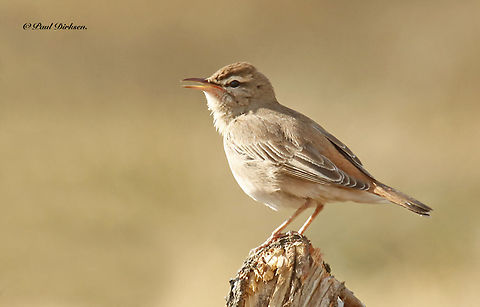
Appearance
Adult male and female rufous-tailed scrub robin look alike and measure about 6 inches long with relatively long legs and a large rounded tail. The upper parts are a rich brownish chestnut, with the rump and uppertail coverts rather more rufous. There is a distinct curved, creamy-white broad streak from the nostrils to behind the eye and a dark brown line through the eye. The under-eye area is whitish and the ear coverts pale brown. The eye and the beak are both brown but the lower mandible of the beak has a greyish base. The underparts are buffish white, with the chin, central belly and undertail coverts paler than the other parts. The feathers of the wing are dark brown, fringed on the leading edge with buff and on the trailing edge with pale chestnut-brown and with the secondaries tipped with white. The central pair of feathers on the tail are bright rufous-chestnut with narrow black tips and the rest a similar colour with white tips and adjacent broad black bands. The legs and feet are pale brown. Juveniles are similar in appearance but generally a paler sandy-brown colour. The plumage is moulted in the autumn and prior to this, the white tips of the tail feathers may have become reduced in size or worn off.The song is a somewhat lark-like but often disjointed series of notes, sometimes clear and loud but at other times soft, and is sung from an elevated position near the top of a tree, on a pole or on a wire. It has been described as having a sad tone.
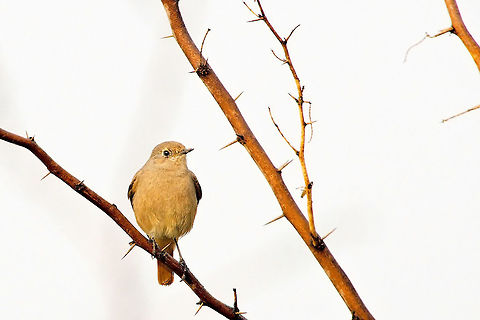
Naming
The scientific name is from Ancient Greek. "Cercotrichas" is from "kerkos", "tail" and "trikhas", "thrush", and "galactotes" means resembling milk, from "gala", "milk".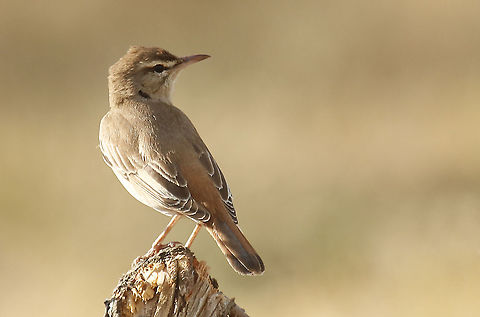
Distribution
The rufous-tailed scrub robin is a partial migrant. Its breeding range extends from Portugal, southern Spain and the Balkan Peninsula, through the Middle East to Iraq, Kazakhstan and Pakistan. In Africa it breeds from Morocco to Egypt and south of the Sahara as far east as Somalia. It is an uncommon vagrant to northern Europe. It winters in North Africa and eastwards to India.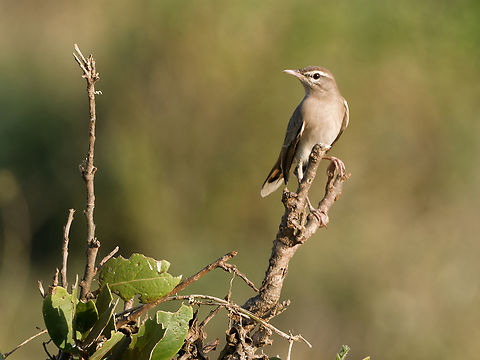
Behavior
The rufous-tailed scrub robin is found flitting among dense cover but also in more open positions on trees, the tops of bushes and on posts. It is frequently seen on the ground hopping about and flaring and bobbing its tail up and down. When perched it also displays its tail in this way and also sometimes droops its wings before giving them a little flick forward. It feeds mainly on the ground on insects such as beetles, grasshoppers and the larvae of butterflies and moths, and on earthworms, turning over the leaf litter to find its prey.The male rufous-tailed scrub robin has an unusual display flight involving a downward swoop with uplifted wings and may sing while displaying. The nest is built a few feet off the ground in a bush, a hedge of prickly pear, on a tree stump or other concealed place. It is usually well-hidden and is untidily built of grasses, stems, roots and other fibres. The inside is neatly cup-shaped and is lined with fine roots, hairs and often a piece of snakeskin. A clutch of four to five eggs is laid. The eggs average about 22 by 16 millimetres and have a pale greenish or greyish-white background colour liberally sprinkled with greyish-brown spots.
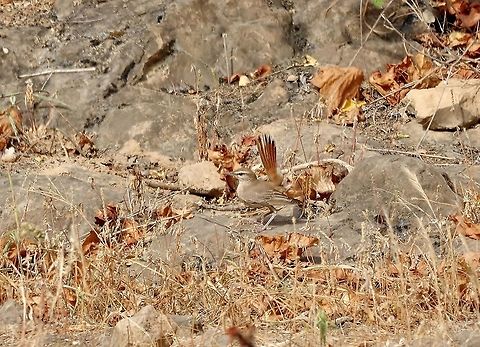
Habitat
Its habitat is dry scrubby open country with patches of dense bushes in lowlands or foothills; where it is numerous, it may also be found in parks, vineyards and large gardens.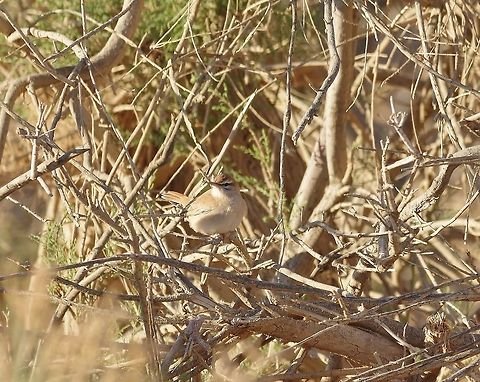
Reproduction
The rufous-tailed scrub robin is a bird of dry open country with bushes and shrubs. It builds its nest a few feet off the ground; there are three to five eggs in a typical clutch.References:
Some text fragments are auto parsed from Wikipedia.